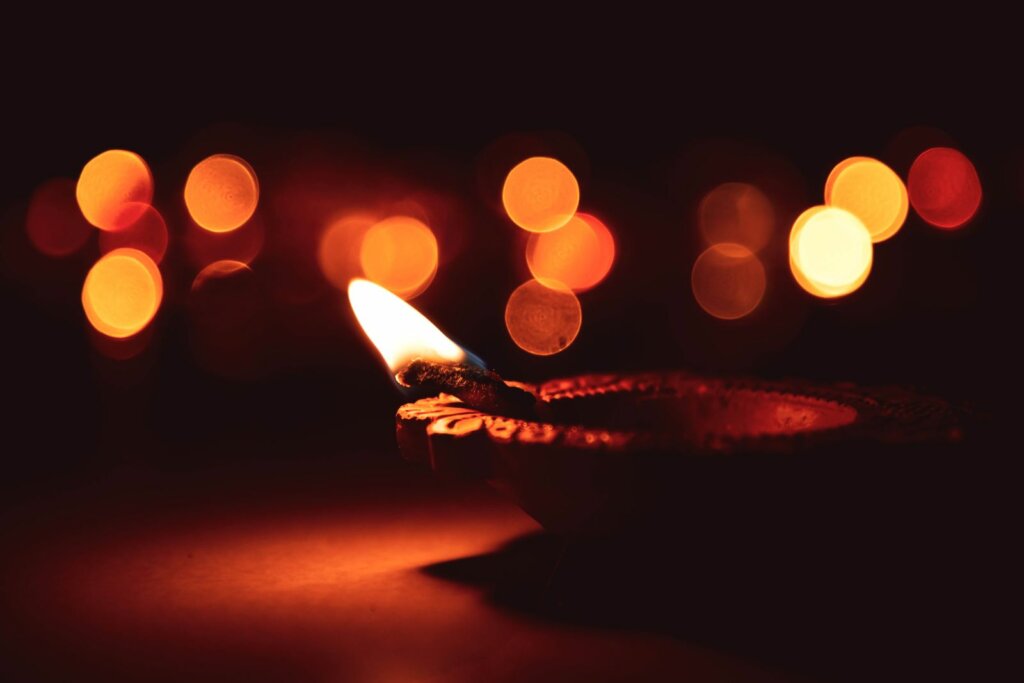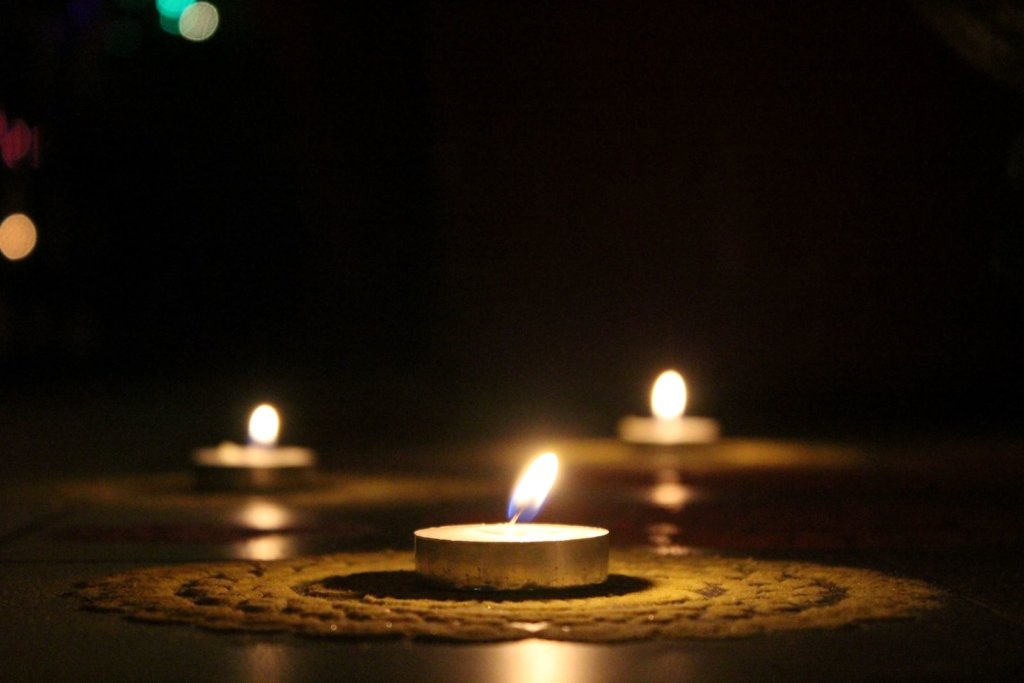I always find Diipavali or Diwali to be an interesting holiday. The timing changes because it’s attached to the new moon in the month of Karttik, which is mid-October to mid-November. It’s dark, there’s no illumination. Symbolically, the day before Diipavali represents a time when it seems like light can’t win, won’t win. That evil will triumph and maintain its grip on society.
And then the holiday arrives. Diipavali signals to us that light is victorious, that good does triumph over evil and that knowledge eventually prevails. According to my spiritual teacher, the origins of Diwali are a war battle. A king attacked Lord Krsna’s capital city, Dwaraka, and the warrior Satyabhámá, a woman, I might add, launched a fierce counterattack against the invading forces. The army was defeated and the whole city was joyful. Residents celebrated by lighting fourteen candles and on the following evening worshipped Satyabhámá with festivities and elaborate lights.

We can be the light. Photo by wilson mathew on Unsplash
That’s exactly what diipavali means. The word comes from dīpa, which means lamp or light, and āvali, which means a row, a range, a continuous line, a series. So we’re celebrating a row of lamps both literally and metaphorically. You might notice Diipavali is similar to Hanukkah, another holiday that involves lights in a row. And just like modern Jews celebrating Hanukkah, Diwali is no longer about a war battle. It represents a symbolic battle where we remember the flame of one lamp lights up countless others both literally and metaphorically.
I’ve had moments recently where I want to burrow under the covers and completely withdraw from the world. I don’t enjoy what’s happening nor the vitriol it’s inspiring. Everything seems so dark and then I remember a quote from Rumi who said, “If everything around seems dark, look again, you may be the light.”
I think that’s what Diipavali reminds us. It’s not only that in the end good will triumph, it’s also the recognition we have a part to play in that victory. When we spread our light, our goodness, we light up other people. And together, we create a row of lights such that darkness retreats. We may be few in number but that doesn’t mean we’re any less powerful.
To paraphrase my spiritual teacher, the strength of five good people is more than the united strength of a hundred immoral people. It also echoes the famous Margaret Mead quote: “Never doubt that a small group of thoughtful, committed citizens can change the world; indeed, it’s the only thing that ever has.”
A lot of little lights can conquer darkness. And this is something we must do over and over again. Unlike a single war battle, Diipavali encourages us to hold onto light, to keep shining, and to remember that one by one by one our actions add up to something bright.
I dream of a world where we have faith that good always wins in the end. A world where we remember light drives out darkness. A world where we understand that we all have a part to play in making the world a better place. A world where we recognize that our light lights up others. A world where we hold onto that light and create a better world for everyone.
Another world is not only possible, it’s probable.
Right now, all over the world people are celebrating Diipavali or Diwali, a festival of lights that symbolizes the spiritual victory of light over darkness, good over evil, and knowledge over ignorance. There’s something interesting for me about how Diipavali is coinciding with the fires in California. I know October is a dry month for California so it’s no surprise my beloved state is on fire, but there’s something especially poignant about the timing of it all.
What I mean is it’s coming to light, pun intended, that Pacific Gas and Electric, the utility company in northern California, is responsible for the blazes raging both currently and last year. Last year an entire town, Paradise, burned to the ground due to PG&E’s negligence, and prompted the company to file for bankruptcy. The utility company has known about the trouble with its equipment for decades and didn’t upgrade it. It’s only now that we can pin the blame squarely on PG&E’s shoulders that something is being done about it.
What I’m seeing over and over again is corruption floating to the surface. Secrets are emerging, we’re shining a spotlight in the dark corners, and watching cockroaches scuttle away. Not only with PG&E, but with the impeachment inquiry as well. Shady practices that Trump engaged in are emerging and the majority of us are saying, “No. This is not OK.”
However, unlike with Diipavali where good has triumphed over evil, I don’t think we’re there yet. Instead, we’re in the day before Diipavali, metaphorically speaking. The day before the festival is supposed to be the darkest day of the year when it seems like light will never win. It’s a question I’ve been asking myself lately. I cannot express how angry I am at PG&E, as well as the behavior of corrupt politicians and CEOs. I want to shake everyone by the shoulders and say, “No, no, no! You can’t do this!”
I’m pretty sure I’m not alone here. I notice a swell of anger and frustration erupting but where is it supposed to go? What are we supposed to do? Some are taking to the streets. Others are writing petitions or conversing with elected officials. I’m doing the same but it doesn’t feel like enough. And then I think about Diipavali. The word comes from dīpa, which means lamp or light, and āvali, which means a row, a range, continuous line, series. Essentially a lot of little lights can conquer darkness. One by one by one our actions add up to something bright and Diipavali reminds me of that.
I dream of a world where we have faith light drives out darkness. A world where we believe good conquers evil. A world where we remember our little actions coalesce into something bigger than us and creates a better world for all of us.
Another world is not only possible, it’s probable.
